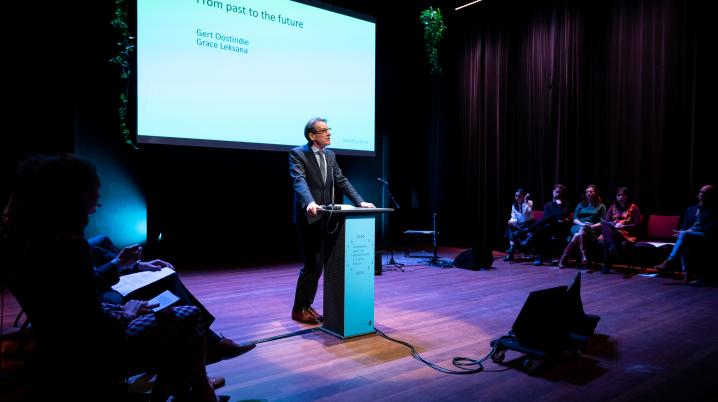
Gert Oostindie at Indonesia and the Netherlands - a joint future: The colonial past and its future
Your Majesties, Excellencies, ladies and gentlemen,
I have been asked to say a few words about the past of Indonesian-Dutch relations and, to say so, the future of that past. We may agree that our history, through over three centuries of colonialism, was divided and tends to remain divisive. But I assume most of us would hope that from this divided and divisive past we may work towards a shared future, and that both this meeting and the upcoming state visit were planned in that spirit. Surely, that spirit also guides the work of most of my colleagues, and myself. But as this state visit comes at a highly symbolic year, I cannot but start off by discussing the painful closing episode of this history.
This year, we are 75 years past the Indonesian declaration of independence on 17 August 1945. The opportunity to bring at least a decent, peaceful closure to a history of Dutch colonial domination was missed at the time. The Dutch failure was, of course, acknowledged sixty years later in the frame of ‘A war at the wrong side of history’ and by the de facto recognition of the 17th of August as the founding moment of the Republic of Indonesia. But the memories of colonialism, of the Dutch repression of nationalism, and particularly of the last all-out Dutch war on Indonesian soil are still among us, and continue to spark emotions.
The colonial era and this last war, with its extremely unequal distribution of lives lost, produced the ‘scars of resentment and regret’ which Queen Juliana was referring to in 1949, in Amsterdam, at the official transfer of sovereignty. It took Dutch politics, and Dutch society at large, a long time to start developing a more critical perspective on this war, and on Dutch colonialism as such. Certainly there are those who still support the frame of ‘something magnificent was achieved there’, but at a governmental level and beyond, that attitude has given way to critical reflexivity. This is a painful process of facing up to a past that provides an embarrassing contrast to the rosy self-image that the Dutch have long nurtured. I observe a long-winding shift from smug self-confidence through doubt towards a frame of recognition and ultimately, hesitantly, also apologies, as in the case of Dutch war crimes committed in Rawagede and Sulawesi. This is the new, critical spirit in which, for example, Amsterdam hosts the national monument in recognition of slavery and in which, recently, the city named some thirty streets after Indonesian and Caribbean men and women who engaged in the struggle against Dutch colonialism.
But no matter how much we rethink and reframe the past, we cannot undo it. This is one reason why both the Indonesian and the Dutch governments have long been using phrases such as ‘Looking forward, rather than looking backward’. This is a convenient way out, and in a sense even a wonderfully generous gesture by the Indonesian government to the Dutch. It is however not a gesture that should enable a premature ending to the still contested process of Dutch self-criticism. There is a lot of joint work to do before we can really reach some sort of closure, or at least a fresh and more inclusive understanding of what we, for better or for worse, have shared in the past. This effort is nothing less than a duty. It is only through deep conversations among Indonesians and Dutch that we can further this process, and that we might hope to start moving on, beyond our mutual postcolonial sensitivities.
This is not the time and place to reflect at any length on the Dutch legacies in Indonesia. Beyond the clichés of merely ‘scratching the surface’ or conversely the references to contemporary territorial, judicial and religious legacies, we are only beginning to understand the patterns of postcolonial continuities and discontinuities in Indonesia itself. There is an exciting agenda for bilateral research and reflections there.
I should, in closing, say a few words about the legacies of Dutch colonialism in the Netherlands itself. Some feel that these are more significant than the other way around. We may argue about that. But either way, there is no doubt that Indonesia deeply impacted the Netherlands during the colonial era. Think wealth, geopolitics, career opportunities, mentalities. But also think cuisine, architecture, arts, literature. And paradoxically, Indonesia impacted even more after colonialism had ended. I am, of course, referring to the communities originating from 300,000 Indisch, Moluccan, Chinese and Dutch ‘repatriates’, they and their offspring numbering over one million Dutch citizens today. And I am thinking also of the veterans from the last Dutch colonial war in Indonesia, the last of whom are still among us. All of these repatriates have added their share to Dutch culture, including the ways the Dutch have framed their colonial presence in Indonesia, and the ways we aspire to move beyond that past.
Within these communities, but also in Dutch society at large, we witness continuous rediscoveries and widely divergent reinterpretations of the colonial past. Again, I observe a growing openness and self-reflexivity. Among a younger generation, I also see ever more attempts to engage in this work of rethinking the past in joint Indonesian-Dutch efforts, and not only in historical research, but equally through a range of artistic approaches. There is indeed a world to gain in such creative efforts to engage with, and move beyond, our uncomfortable past.
On that note, I would like to give the floor to Grace Leksana, who just finished her PhD in Leiden and over the past four years has developed and shared a host of inspiring ideas about these issues.
Gert Oostindie, Brakke Grond, 18 February, 2020

